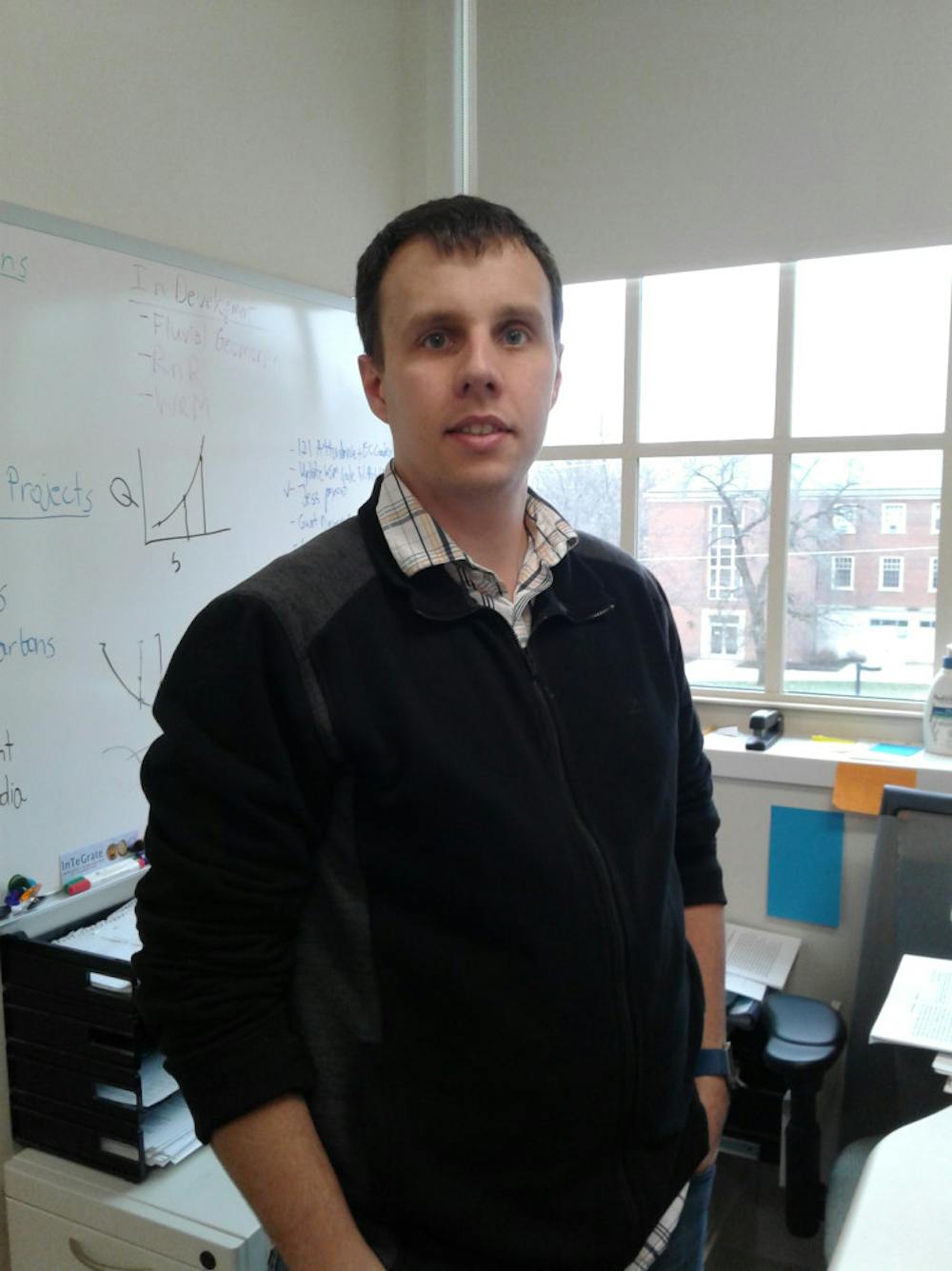By: Rachel Spahr
Bartosz Grudzinski, 31, is one of the youngest professors at Miami University.Originally from Poland, Bart came to the United States at age 2 with his parents and grew up in Chicago, Illinois. In his free time, he enjoys rock climbing, running, and swimming. He has even competed in an IronMan race. The maps and artwork decorating his Shideler Hall office wall embody his love for geography, water, and big cities.
Bart has three degrees, all in geography. He earned his bachelor’s in 2008 from Eastern Illinois University, where he decided he wanted to be a geographer. Bart earned his master’s in 2010 from Northern Illinois University, where he researched groundwater flow on Mars.
“I literally scanned the entire planet of Mars… that was a fun assistantship,” he says while laughing.
In 2014, he received his Ph.D. from Kansas State University, where he was awarded a doctoral dissertation research grant from the National Science Foundation to research the water pollution impacts of bison and cattle grazing, and the shape of streams.
Bart chose to study geography because he has always loved exploring rivers. He says, “I’ve just always been fascinated by water. As a kid, I had a blast every time I was out on a river.”
Bart’s environmental focuses are on water quality and hydrology. One of Bart’s graduate students, Jeff Lazar, says, “Bart and I have overlapping interests. We both love being outside and want to understand more about our environment. Bart has studied fluvial geomorphology for years and I hope to learn of the field from him so that I am able to apply that to my own career.”
Jeff describes Bart as laid back and easy to work with. He says Bart’s strength and weakness are both that, “Bart likes to dive right into projects and just start working. This method allows me to get a lot of experience very quickly… I like to understand a project before beginning, Bart takes the opposite approach, he understands by doing.” Jeff says he has learned a lot of practical skills from Bart and appreciates that he is always willing to help him out.
Now in his third semester at Miami as an assistant professor in geography, Bart loves the balance of research and teaching Miami offers.

What do you enjoy most about teaching?
“Definitely not the grading. *laughs* I think it’s seeing students that weren’t interested in a topic become more engaged and interested in the class… Just having students becoming more environmentally aware is probably the most rewarding part.”
What’s the hardest part about teaching?
“The hardest part about teaching for me is making sure that I’m teaching relevant things that they do find interesting.”
Can you describe your teaching style?
“I was a very traditional Powerpoint lecturer and then I started going to teaching workshops… now I try to do a lot more interactive stuff so we’ll do more hands-on activities.”
Have you noticed the students becoming more engaged now that you’ve switched up your teaching style?
“Yeah, the students participate a lot more. It’s not like pulling teeth to get someone to answer a question at 8:30. They’re more comfortable with discussing their opinions with other students, and troubleshooting problems, and coming to a solution and working as a team.”
Where do you see yourself in the future? Still teaching?
“Yes, I want to stay in academia for sure. I think it’s a great life as long as you do it the right way and live balanced.”
Can you describe the research you’re currently working on with your graduate students?
“We are trying to figure out what the main drivers (are) of sediments, nutrients, and metals in 8 different rivers along a gradient of land use and watershed area. To see how these things change with season and flow.”
Are there any other research projects you are currently working on?
“Kinda getting my feet wet with a couple. A hydrocarbon project. I’m also interested in the impacts of beaver dams.”
If you got unlimited funding for a study you designed what would it be and where?
“I would go to New Zealand I think, because the landscape is amazing - you’ve got the ocean, mountains, steep rivers with lots of white water… As far as studying probably something similar to what I’m doing now. It would involve getting out, going into the water, sampling water, setting up monitoring stations to learn the behavior and characteristics of the river.”
Any advice for someone going into the environmental field now?
“Have thick skin - it can be daunting because there is a lot of competition, but at the same time all you need is one job, so it’s not like you need to find a new job every week. So just stay positive.”

